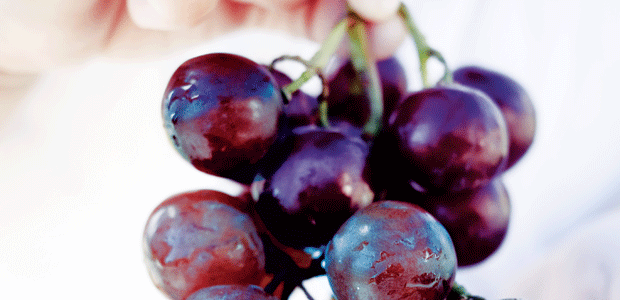Advertisement
Glorious Grape Juice
Red wine's healthy alternative

Move over red wine, purple grape juice is proving to be just as beneficial to our health without the negative effects associated with alcohol consumption.
Packed full of powerful antioxidants that have been shown to do everything from reducing inflammation to discouraging artery-blocking clots, studies have found that as little as two cups (500 mL) of purple grape juice consumed daily may do wonders for our health.
Heart healthy
Researchers from the Universit?e Strasbourg in France have found that purple grape juice is just as effective as red wine at increasing nitric oxide production in the arterial lining. Nitric oxide causes the arteries to relax and widen, allowing blood to flow freely. Purple grape juice’s ability to lower blood pressure has been attributed to this artery-widening effect.
In one study researchers found that when hypertensive men drank purple grape juice daily for eight weeks, the participants experienced a significant reduction in both their systolic and diastolic blood pressures.
In addition to lowering blood pressure, purple grape juice may also have a positive effect on cholesterol levels. Researchers have found that the flavonoids in purple grape juice may help slow the oxidation of LDL (bad) cholesterol in the arteries while increasing the levels of HDL (good) cholesterol.
Healthy blood pressure and cholesterol levels are essential in reducing the risk of heart disease and stroke.
Brain juice
The powerful antioxidants in purple grape juice not only keep the heart healthy, but may also help protect the brain against the accumulative effects of oxidative stress and inflammation that occurs with aging.
Researchers from the University of Cincinnati found that when 12 adults with early memory decline drank between 15 and 21 ounces (444 to 621 mL) of purple grape juice daily for 12 weeks, the participants showed significant improvement in cognitive function, including short-term memory retention and spatial memory.
Although research is still preliminary, there is also evidence to suggest that the polyphenols found in purple grape juice may be beneficial in delaying the onset of Alzheimer’s disease.
In one population-based study participants who reported drinking juice containing a high concentration of polyphenols at least three times a week were 76 percent less likely to develop Alzheimer’s disease than those who drank it less than once a week.
Previous studies have shown that resveratrol, a polyphenol found in the skin of purple grapes,can significantly reduce the levels of amyloid beta peptides in the brain. Amyloid beta peptides are commonly found in the brain tissue of people with Alzheimer’s disease.
Possible anticarcinogen
If keeping the heart and brain healthy wasn’t enough, purple grape juice may have anticarcinogenic properties as well.
Researchers at the University of Illinois have found that the flavonoid anthocyanin in purple grape juice may help protect healthy human breast cells from DNA damage that can lead to cancerous tumours.
In a laboratory test, researchers exposed healthy human breast cells to an environmental carcinogen. When purple grape juice compounds were added, the researchers observed that the compounds inhibited the carcinogen from causing DNA damage while also increasing the enzyme activity that detoxifies carcinogens from the body.
Purple grape juice is also showing promise in the treatment of pancreatic cancer. In one study, when researchers treated pancreatic cancer cells with the antioxidant resveratrol in combination with radiation, they found that the antioxidant was able to destroy the pancreatic cancer cells while at the same time protecting normal tissues from the effects of the radiation.
Moderation is key
Although there are many positive health benefits associated with drinking purple grape juice, remember, with approximately 170 calories per 250 mL serving, too much may have a negative effect on the waistline.
Powerful purple juices
Regular consumption of purple- and blue-coloured fruits has been associated with a lowered risk of metabolic syndrome, a risk factor for heart disease, stroke, and type 2 diabetes. Like purple grape juice, the following five purple-hued juices all pack a healthy antioxidant punch.
Acai berry
Acai berry juice is a good source of LDL cholesterol-lowering dietary fibre, heart-healthy fatty acids, and free-radical-fighting antioxidants.
- 125 calories per 250 mL serving
- ORAC value: 102,700 units per 100 mL serving
Gogi berry
Used in Chinese medicine for centuries, goji berry juice is an excellent source of immune-boosting vitamin C and beta carotene.
- 166 calories per 250 mL serving
- ORAC value: 25,300 units per 100 mL serving
Wild blueberry
A nutritional superstar, blueberries rank high in antioxidants that may improve memory and help fight aging, cancer, and heart disease. Pure, wild blueberry juice can now be found in many health food stores.
- 110 calories per 250 mL serving
- ORAC value: 6,552 units per 100 mL serving
Pomegranate
This heart-healthy juice is rich in vitamins A, C, and E and contains antioxidants that may help prevent cholesterol buildup in the arteries.
- 140 calories per 250 mL serving
- ORAC value: 2,341 units per 100 mL serving
Cranberry
Known for its ability to prevent and treat urinary tract infections, research is showing that cranberry juice may also promote healthy cholesterol levels, aid in stroke recovery, and even help prevent cancer.
- 130 calories per 250 mL serving
- ORAC value: 865 units per 100 mL serving





